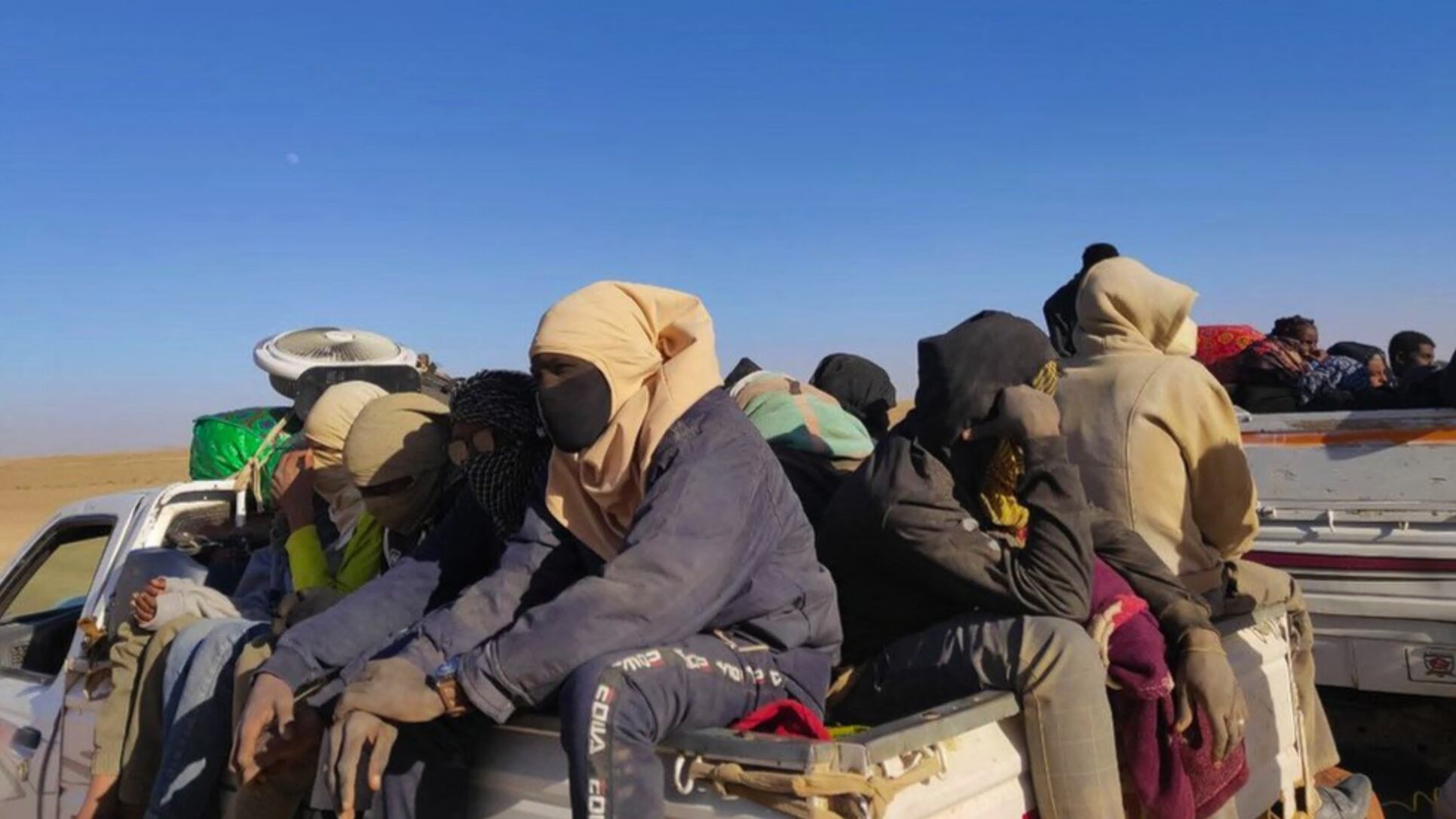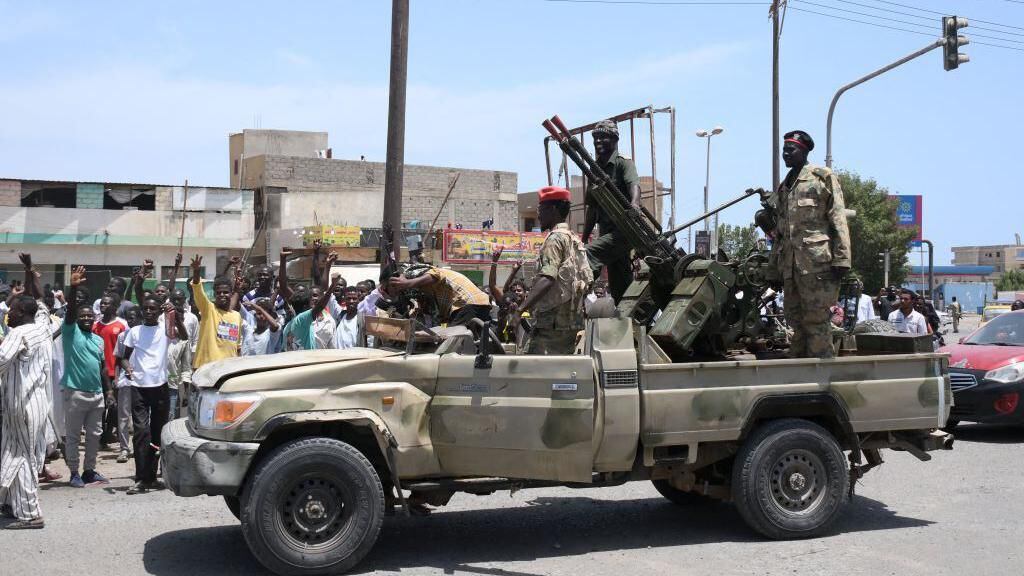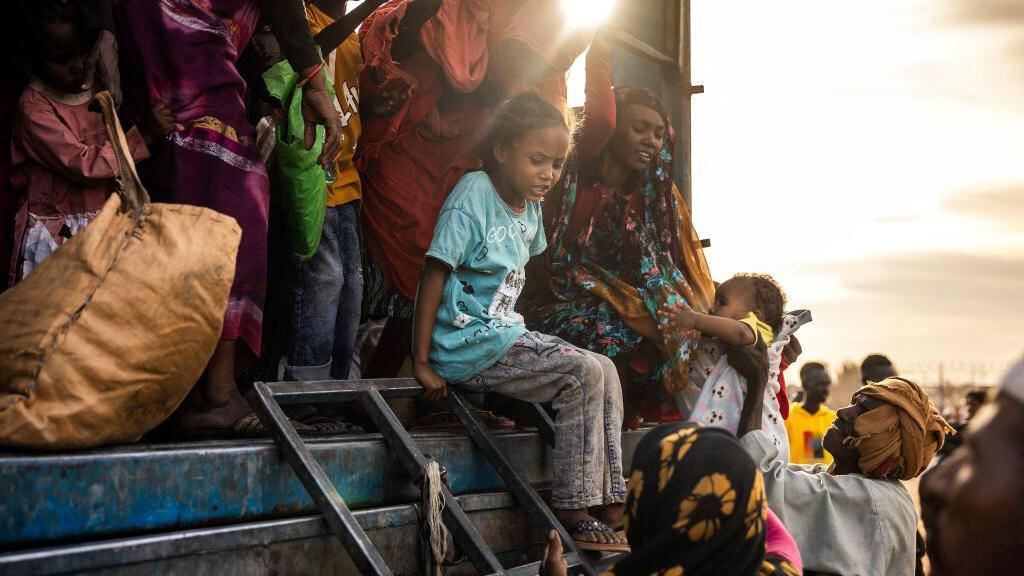“They left me in the desert with my dead mother,” says Om Salma*, who was abandoned by a group of human traffickers somewhere on the road between Sudan and Egypt.
The 25-year-old says her mother died when the convertible truck they were traveling in crashed. As a result of the accident, her mother was thrown from the vehicle.
LOOK: The dilemma of devout Christians in the USA after the Alabama court decision that considers embryos to be people
“We tried to tell the driver to slow down,” says Om Salma. But it was too late. The woman, who was 65 years old, hit her head and died.
In tears, Om Salma was removed from the truck, along with her brothers and the few belongings they had. The smugglers refused to transport her body and, due to the young woman’s pain, left.
Om Salma and his family were trying to escape the conflict in Sudan, which the United Nations (UN) describes as “the biggest displacement crisis in the world”.
According to the UN, more than eight million people have been forcibly displaced since violent clashes broke out in April between the Sudanese Armed Forces (SAF) and the paramilitary group Rapid Support Forces (RSF).
It is estimated that 450,000 people They left Sudan in the last 10 months to cross the border into Egypt.
Escape
Heavy fighting broke out in Khartoum, the country’s capital, last year as a result of a fierce power struggle between several military leaders. It quickly spread throughout Sudan and forced many people to flee their homes.
As the fighting approached Omdurman, Om Salma’s hometown, she heard gunshots.
“We had to leave. Our lives were in danger.”
Many people He was told it was “impossible” to obtain a visa travel legally to Egypt quickly. So he decided to turn to a man who charged $300 per person smuggle your family from Sudan.
Human trafficking is widespread along the 1,200-kilometer border between the two African countries. Traffickers, mostly men, are often involved in gold mining in northern Sudan and southern Egypt.
They already work in the area, know the rugged desert terrain and have access to trucks to transport people.
Om Salma and his family headed to the northern city of Gabgaba. This is a known starting point for cross-border people smuggling, so much so that locals have nicknamed it Gabgaba airport.
Om Salma was told that they would be transported across the desert and border to the city of Aswan in southern Egypt.
They had already traveled eight hours and stopped to sleep for the night before the accident.
Now, in the desert, with little food and water and her mother’s dead body, she and her brothers were lost.

Finally, after hours of waiting in the desert, Om Salma stopped a car.
He managed to convince the driver, who was transporting food and household appliances from Egypt to Sudan, to take them and his mother’s body to the city of Abu Hamadwhere they had already remained.
The family arrived safely in Abu Hamad, where they were later able to bury Om Salma’s mother.
There are more stories
The story of Om Salma is common in recent times. Accidents frequently occur in the border area. And the fact is that human traffickers They often drive open trucks at high speed to escape the authorities.
Ibrahim*, who is now in Cairo, says that when he was smuggled out of Sudan, a man he was traveling with broke his neck and died after the truck they were traveling in hit a rock.
The man was alone and, despite the group’s requests, the smugglers insisted on leaving his body and burying it in the desert.
“Everyone was horrified. I looked out the window at the unmarked grave as we drove away, while the women and children in the truck cried,” says Ibrahim.
O robberies They are also common. Halima*, 60, says she had a terrifying experience when she was smuggled with her family through the Sudanese desert before reaching Egypt.
“We were attacked by four masked gunmen when our truck broke down. They shot into the air, slapped my daughter and stole our belongings,” she says.
But Halima claims her 25-year-old daughter was so shocked that she died the next day when they arrived in Egypt.
“He had a panic attack and couldn’t breathe,” says Halima, adding that they couldn’t get medical help in time.

The BBC has seen a copy of the death certificate, which cites respiratory problems as the cause of death.
Additionally, the BBC contacted the Egyptian government to ask what it is doing to combat illegal human trafficking from Sudan, but we have not received a response.
The visas
Abdel Qader Abdullah, from the Sudanese consulate in Aswan, southern Egypt, told the BBC that it is an illegal crime to cross desert borders without a visa and that authorities have launched a campaign to raise awareness of the dangers associated with human trafficking.
“The Sudanese consulate in Aswan is working with the Egyptian government to help speed up the visa process, help increase the number of approved applications and allow more Sudanese to enter the country legally,” said the official.
Women and children were allowed to enter Egypt without a visa, but the government imposed new restrictions after the start of fighting in Sudan.
Demand in Sudan for an Egyptian visa is high as people want to escape the conflict.
They can apply for an Egyptian visa in two places in Sudan: Wadi Halfa in the north and Port Sudan in the east.
Most head to Wadi Halfa as it is closer to Argeen, the main land border crossing with Egypt. But in Wadi Halfa there is almost no infrastructure.
People wanting a visa wait in line for hours to complete the process. After applying, it can take months to find out if they were successful.
Displaced and with little money, many wait in Wadi Halfa to receive news about their candidacy, spending the night in any location, such as nearby schools or on the streets.

A new attempt
Still determined to leave Sudan, Om Salma tried the legal route on her second attempt. He traveled to Port Sudan to apply for a visa at the Egyptian consulate.
But after waiting two months, he gave up and opted for the illegal route again.
Many people are denied visas and cannot wait, often deciding to spend the little money they have left on a smuggler to get them out of the country.
Om Salma says he learned his lesson from the horrors of his first attempt and approached a different smuggler.
“This time we prepared for the trip”, he explains.
“We spent about six days in the desert,” he says, before successfully crossing the border into southern Egypt.
Once in Egypt, the situation for Sudanese migrants is not over yet. If they do not have refugee status or cannot prove that they have an appointment to apply for it, they may be deported.
To make an appointment, they must travel to Cairo or Alexandria.
At the United Nations High Commissioner for Refugees (UNHCR) center in Cairo, thousands of Sudanese migrants, mostly women and children, wait in long lines to register their names and obtain what is known as a yellow card.
Halima says she “stood in the cold for hours, only to schedule a meeting for four months later.”
“Obtaining a yellow card, once you are a refugee registered with the UN, allows you to get work legally and receive monthly resources from the organization”, he explains.
No hope of returning
Ibtessam was smuggled from Sudan to Egypt last summer with three generations of her family, 17 members in total, including her parents and children.
But he says that despite having a yellow card, he has not received any money since arriving in June.
“I don’t know how I can support my family. My husband died, I have to pay rent and monthly fees every month and no one helps us.”
UNHCR spokesperson Christin Bishay acknowledges the frustration and suffering felt by Sudanese migrants in Egypt, but says the organization “faces a shortage of funds.”
“We have expanded our capacity by 900%. That’s why we have to prioritize and think: ‘Who needs help first?'”, he explains, adding: “We have established medical services on the border with the help of the Red Moon Society of Egypt” .
Life is not easy for Sudanese immigrants in Egypt, like Om Salma, who have to find a place to live with little help or money.
She says she is worried about the future. The ideal would be to one day return to his home country, but due to the conflict, he fears that will never happen.
*Names in this story have been changed to protect sources.
Source: Elcomercio
I am Jack Morton and I work in 24 News Recorder. I mostly cover world news and I have also authored 24 news recorder. I find this work highly interesting and it allows me to keep up with current events happening around the world.

:quality(75)/cloudfront-us-east-1.images.arcpublishing.com/elcomercio/6OIKTBQDTFB25ATS4UXSCZVXBI.jpg)


:quality(75)/cloudfront-us-east-1.images.arcpublishing.com/elcomercio/L2XQ7RK4CBDG5EEQYINPB6SP3I.jpg)
:quality(75)/cloudfront-us-east-1.images.arcpublishing.com/elcomercio/H4RHSDAKHJD7FBEIKBS3OG3TEM.jpg)
:quality(75)/cloudfront-us-east-1.images.arcpublishing.com/elcomercio/QRA76QQN7BD3LLER6J5KOGZ4K4.jpg)
